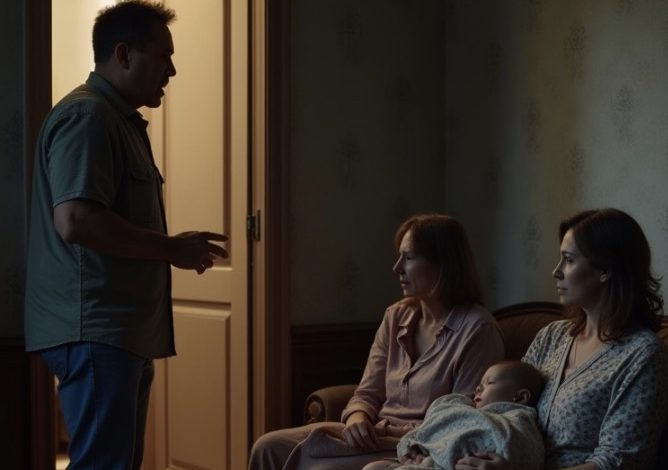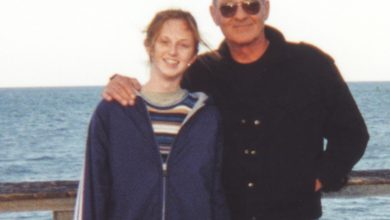“They Tried to Push Me Out of My Own Home — One Phone Call Shifted All the Power Back”

“Take your child and go. You’ll never be my equal,” my husband said, his voice like ice, while his mother smirked in satisfaction beside him.
They thought they had crushed me — a small-town girl with no power, no voice, no future.
What they didn’t know was that I had been quietly preparing for this moment for months.
And soon, with one phone call, everything they believed about control, money, and power would turn upside down.
“My mother was right. You’re just a girl from Cedar Creek — small-town, small dreams. You’re not on my level,” Victor spat as he shoved me into the hallway, my baby boy in my arms.
I didn’t cry.
I didn’t even flinch.
I just looked at him, calm and steady, and smiled. Not a broken smile, but one that carried warning — sharp, cold, deliberate.
“Fine,” I said quietly. “You asked for it.”
The sound of the door slamming echoed down the building’s old stairwell. It was a building that had seen better decades — brown paint peeling from the rails, pipes humming behind thin walls. Somewhere upstairs, two elderly neighbors leaned over their balconies to see what was happening.
I held Max closer. He didn’t even stir at the noise. My sweet boy had learned to sleep through shouting — his father’s voice had been a storm in our home since the day he was born. I kissed his tiny forehead, breathing in the smell of baby lotion and innocence.
“It’s over now, my love,” I whispered, making my way down the stairs. “It’s really over.”
Outside, the September air bit at my cheeks. The courtyard, where I had once imagined planting flowers, was now littered with fallen yellow leaves. The poplar trees rustled softly above me — the same ones that had swayed the first day I visited the apartment five years ago, when life still seemed promising.
That night, as I walked to my parents’ house with Max sleeping soundly in my arms, my mind drifted through the wreckage of my marriage.
Victor Davenport — the man I once loved for his easy laugh and his charm — had turned into a shadow of his mother, Tamara. A bitter, controlling woman who saw everyone as competition, even me.
We had met in college. He was the funny one — always surrounded by friends, always the center of attention. I was the quiet scholarship student who studied too much and rarely went to parties. When he asked me out, I thought it was fate.
We got married during our senior year.
After graduation, I received a job offer in New York. A major auditing firm wanted me on their team. But Victor didn’t want to move.
“Why go to New York?” he said. “We can build a life here in Columbus. Our parents are nearby. We’ll have help.”
By “help,” he meant his mother. Tamara had always seen me as an intruder — the girl who stole her son’s attention. She smiled sweetly at me in public but made sure I knew my place in private.
Still, I gave up my dream job and stayed. I found work as an assistant accountant at a construction firm. A few years later, I became a senior controller. I took out a mortgage and bought our apartment myself. Victor promised to “help with payments,” but there was always an excuse: a broken car, a trip with friends, a new gadget he “needed.”
He worked at a car dealership, but the commissions rarely came. When I came home after long days, he’d be sprawled on the couch, watching football, complaining that I didn’t “pay him enough attention.”
When I reminded him that I was paying for everything — the bills, the food, even his insurance — he’d turn cruel.
“You’re not better than me just because you make more,” he’d hiss. “You should be grateful I even put up with your attitude. My mom says you’ve changed.”
His mother. Always his mother.
Tamara called him daily. She’d scold him, advise him, and fill his head with poison.
“Anna doesn’t respect you, Victor. She’s from a different world. Women like her never stay loyal,” she’d whisper into his ear, pretending to “worry.”
When I gave birth to Max, my life should have changed for the better. But the opposite happened.
The delivery was long and brutal. Thirty-six hours of pain, an emergency C-section, and five days in the hospital.
Victor didn’t show up until day three. He brought flowers too large to fit in the room, snapped a few photos for Instagram with the caption “My favorite people”, and left after thirty minutes.
His mother came a few days later. She looked at the baby as though inspecting a product. “Well, thank goodness he doesn’t look like you,” she said. “He’s got our family’s features.”
Then she asked if I had enough milk, bragging that she had breastfed Victor until he was two. “Back in my day, mothers didn’t take shortcuts,” she said, eyeing the formula on the table.
I bit my tongue.
By the time Max was two months old, I was already working full-time again. There was no choice — I was the only stable income. I typed reports while rocking his cradle with my foot. I worked at dawn before Victor woke up and demanded dinner like a king waiting to be served.
Every night, Victor would call his mother. “Yes, Mom. Yes, she’s still working. No, she didn’t make soup today.” Then came the lectures: “Mom says the curtains look old. Mom says you don’t cook enough. Mom says you should lose the baby weight.”
I endured it all, until one night, I snapped.
“Victor, do you even realize I make seventy thousand a year?” I said, my voice trembling from exhaustion. “You make less than half that, and I pay for everything. What do you contribute besides criticism?”
He exploded. “You think money makes you better than me? Maybe you should find someone richer, huh? But who’d want you — a tired woman with a kid?”
That was the night something inside me broke. Not my heart, but my patience. I stopped arguing. I stopped caring. I just planned.
I started scanning every document — mortgage papers, receipts, contracts — and saving them to a secure folder. I knew the storm was coming.
It arrived on a quiet Thursday.
Tamara appeared at our door, holding a box of pastries like a weapon.
“You need to sell this apartment,” she announced. “It’s too small for three people. Buy Victor a one-bedroom downtown and move somewhere cheaper with the baby. It’ll be easier for you.”
I froze.
“Tamara,” I said, my tone measured. “This apartment is mine. I bought it before we were married. I’m still paying the mortgage — with my money. Victor hasn’t paid a cent.”
“Oh, here we go again,” she sneered. “In a family, everything is shared. Don’t be selfish. My son does plenty — he watches the baby, doesn’t he?”
I laughed bitterly. “He watches the baby for Instagram photos.”
That’s when Victor turned from the TV, his eyes already glazed with beer.
“Don’t you dare talk to my mother like that,” he snapped.
“Victor, please. I’m tired. Can we not fight in front of Max?”
But he was already standing, anger rising.
“You’ve turned into such a snob. My mother was right — you think you’re better because of your stupid job. You’re not my equal, Anna. Take your kid and leave!”
He shoved me toward the hallway. It wasn’t hard, but it was enough. Enough to end it.
I looked him in the eyes, calm as ever, and said, “You’ll regret this.”
Then I left.
The walk to my parents’ home felt like the first breath after years underwater. Their house was just as I remembered — cozy, cluttered, smelling of coffee and warm bread. My father, Nicholas, opened the door, his expression shifting from surprise to anger the moment he saw the baby and my packed bag.
“Anna, what happened?” he asked.
“It’s over, Dad,” I said simply. “Victor and I are done.”
My mother appeared behind him, wiping her hands on her apron. “What? No, you’re just upset. You’ll make up—”
“No,” I said firmly. “I’m done making excuses.”
They listened as I told them everything — the insults, the manipulation, the control. My father stayed silent until I finished, then poured himself a small glass of brandy.
“I knew it,” he muttered. “That man’s a parasite. But you’re home now. We’ll help you.”
The next day, I took action. I went to court and filed for divorce. Then to the bank to verify the mortgage details. And finally, to Sam Marcus — the realtor who had helped me buy the apartment.
“Anna,” Sam said after hearing my story, “legally, your husband doesn’t have a claim. You bought that apartment before marriage. It’s yours.”
“But he’s registered there,” I said.
“Then we’ll need a court order to evict him,” he replied. “I’ll give you a good lawyer.”
That’s how I met Steven Kravitz — a sharp, gray-haired former prosecutor who listened carefully as I explained my case.
“He kicked you out and now wants to split the apartment?” he said dryly. “We’ll handle it. Do you have proof of payments?”
“Yes,” I said. “Every receipt, every bank statement.”
“Good,” he said. “Then we’ll make sure he learns that actions have consequences.”
When I got home and told my father the lawyer’s name, he chuckled. “Kravitz? Steve? He’s your son’s godfather!”
I blinked in disbelief. “What?”
“Of course. He’s my old friend. I asked him to be Max’s godfather. I had a feeling he might come in handy one day.”
For the first time in years, I laughed.
A week later, my boss called. “Anna, New York loved your work. They want to offer you the position of Financial Director — double your salary, relocation assistance, company apartment.”
I could barely speak. New York. My dream city.
When I told Kravitz, he smiled. “Take it. We’ll finalize the divorce remotely. Your husband doesn’t deserve another second of your time.”
The court hearing came quickly. I walked in wearing a simple navy suit, head held high. Victor sat across the room, pale and nervous, with his mother clutching his arm.
He claimed I’d abandoned him, that he paid “everything in cash.” But Kravitz laid down the evidence — every document, every transaction, every witness.
The judge was clear: the marriage was over, custody granted to me, and the apartment declared mine.
Victor’s face crumbled. As we left the courtroom, he hissed, “You’ll regret this.”
Kravitz stepped forward. “Be careful what you threaten, Mr. Davenport. I believe your employer is already reviewing your… business practices.”
Victor went pale.
A year later, I stood in my New York apartment, sipping coffee as Max played with his toy cars on the rug. I had been promoted again — CFO of the company. My life was calm, bright, full of purpose.
Then one afternoon, my friend Chloe called. “You’ll never guess who I saw,” she said. “Victor. He’s working at a supermarket now. He asked about you and Max. He said he’s sorry.”
Later, when Victor called to ask if he could visit Max, I agreed. “At my parents’ house,” I said. “And come sober.”
When I watched him a week later, kneeling in the grass with Max laughing beside him, I felt no anger — only peace.
He had thrown me out with the words, “Take your kid and go.”
But in truth, that night, I had taken my freedom — and my future.
He thought he was ending my life.
He had no idea he was giving me the chance to start it.










